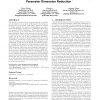Free Online Productivity Tools
i2Speak
i2Symbol
i2OCR
iTex2Img
iWeb2Print
iWeb2Shot
i2Type
iPdf2Split
iPdf2Merge
i2Bopomofo
i2Arabic
i2Style
i2Image
i2PDF
iLatex2Rtf
Sci2ools
118
click to vote
DAC
2007
ACM
2007
ACM
Fast Second-Order Statistical Static Timing Analysis Using Parameter Dimension Reduction
The ability to account for the growing impacts of multiple process variations in modern technologies is becoming an integral part of nanometer VLSI design. Under the context of timing analysis, the need for combating process variations has sparkled a growing body of statistical static timing analysis (SSTA) techniques. While first-order SSTA techniques enjoy good runtime efficiency desired for tackling large industrial designs, more accurate second-order SSTA techniques have been proposed to improve the analysis accuracy, but at the cost of high computational complexity. Although many sources of variations may impact the circuit performance, considering a large number of inter-die and intra-die variations in the traditional SSTA analysis is very challenging. In this paper, we address the analysis complexity brought by high parameter dimensionality in static timing analysis and propose an accurate yet fast second-order SSTA algorithm based upon novel parameter dimension reduction. By d...
DAC 2007 | Design Automation | Parameter Dimension Reduction | Parameter Reduction Algorithms | Static Timing Analysis |
Related Content
| Added | 12 Nov 2009 |
| Updated | 12 Nov 2009 |
| Type | Conference |
| Year | 2007 |
| Where | DAC |
| Authors | Zhuo Feng, Peng Li, Yaping Zhan |
Comments (0)

